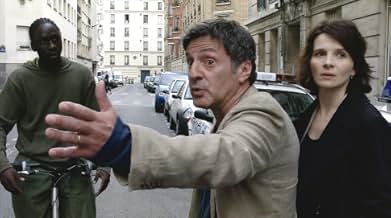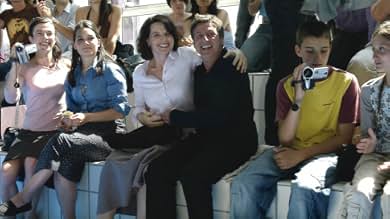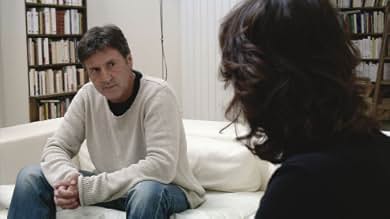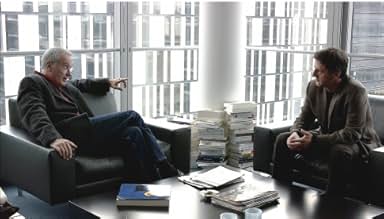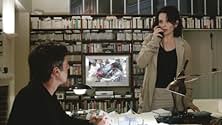Um casal está aterrorizado com uma série de fitas de vigilância deixadas em seu pátio principal.Um casal está aterrorizado com uma série de fitas de vigilância deixadas em seu pátio principal.Um casal está aterrorizado com uma série de fitas de vigilância deixadas em seu pátio principal.
- Prêmios
- 29 vitórias e 37 indicações no total
Avaliações em destaque
A conventional psychological thriller, a social polemic, or a serious work of art. To fully realise even one of these is an achievement, but to realise all three in a single piece of cinema is remarkable indeed.
On the most obvious level, Hidden is a thriller which, in traditional European fashion, gets under your skin in spite of long shots when nothing happens (nevertheless, it is not for the squeamish). Also in typical European fashion, it requires a little more concentration and attention span than the average Hollywood offering to interpret and understand.
George (Daniel Auteuil) and Anne (Juliette Binoche) are a typical well-to-do Parisienne family. George is a TV chat show host for a literary discussion programme, his wife and young adolescent son are normal and easy to identify with. The acting is such that we see them as real people, almost as if in a documentary.
The couple are watching a video. We don't realise this at first. It's simply a video of the outside of their house, nothing more. Then the tell-tale lines on the screen appear as the video is rewound and the camera pans back. There is nothing threatening about the video except that they do not know who took it - it was just delivered on the doorstep. The exact point from which the video was shot is hard to ascertain.
Further videos arrive - still nothing threatening (the police refuse to do anything), but we can not only sense the couple's mounting panic, we are part of it. Nothing in Haneke's film so far justifies the sense of horror which we share with George and Anne but it is intense and very real. George tries to make connections from the clues so far. He feels extremely threatened. He accuses someone from his childhood. The accused is convincing in his protestations of innocence. In this climate of fear and reprisal things can only get worse.
On a second level, Hidden can be taken as both social comment on the tensions between bourgeois France and the ethnic Algerians that inhabit the poorer areas. France is unable to accept or own up to its guilt in its historic treatment of these large minorities, either in the past or the present. As a dynamic that is almost microcosmic, it reaches out to a wider world of have and have-nots, where those with power refuse to acknowledge faults because there is no-one to make them say sorry. This is conveyed in the film first from the typical settings, from wealthy modern areas to more pitiful suburbs, subtle overlays with background TV programs mentioning Iraq (British involvement, of course, not French), and the symbolic way the characters are presented enabling them to be easily transposed to analogous settings. It is a stark condemnation of how those with power (but also with suppressed guilt and a trigger-happy tendency to make accusations) cause much more damage than is necessary because of such shortcomings.
On the third level, as a work of art, Hidden is much more insidious. Director Haneke uses the camera as a tool between him and the audience in such a way that it is impossible to remain a passive, almost hidden viewer. The type of audience that the film will appeal to (educated, probably affluent) is also the one that will be most unsettled. Haneke is doing much more than telling a story - he is using the power of images to interact with his audience in a way that they are not fully aware of (until later analysis).
Then there is the question of who shot the tapes. If you really enjoyed the film but struggle with the answer (which is turns out to be different depending on whether you view it as a psychological thriller or as a polemic/work-of-art), you can go to the official website (which saves me revealing it!) - at which point you will probably want to watch it again to see the details you missed from inattention.
Hidden is a remarkably accomplished work. It is difficult to watch any scene and think of Binoche as Binoche (or Auteuil as Auteuil) rather than the character being played. In terms of directorial technique it will no doubt be an inspiration to film-makers for years to come. In terms of films that can alter the way we view the world it is first class - all the more so for the fact that its message is indirect (or hidden) rather than displayed ostentatiously and openly. Working out the superficial answer to the puzzle is all the more satisfying after piecing the clues together yourself. Working out the deeper sense, persuades by allowing the viewer to come to an undeniable realisation. Are ytou still paying attention? Don't fall asleep in this movie . . .
On the most obvious level, Hidden is a thriller which, in traditional European fashion, gets under your skin in spite of long shots when nothing happens (nevertheless, it is not for the squeamish). Also in typical European fashion, it requires a little more concentration and attention span than the average Hollywood offering to interpret and understand.
George (Daniel Auteuil) and Anne (Juliette Binoche) are a typical well-to-do Parisienne family. George is a TV chat show host for a literary discussion programme, his wife and young adolescent son are normal and easy to identify with. The acting is such that we see them as real people, almost as if in a documentary.
The couple are watching a video. We don't realise this at first. It's simply a video of the outside of their house, nothing more. Then the tell-tale lines on the screen appear as the video is rewound and the camera pans back. There is nothing threatening about the video except that they do not know who took it - it was just delivered on the doorstep. The exact point from which the video was shot is hard to ascertain.
Further videos arrive - still nothing threatening (the police refuse to do anything), but we can not only sense the couple's mounting panic, we are part of it. Nothing in Haneke's film so far justifies the sense of horror which we share with George and Anne but it is intense and very real. George tries to make connections from the clues so far. He feels extremely threatened. He accuses someone from his childhood. The accused is convincing in his protestations of innocence. In this climate of fear and reprisal things can only get worse.
On a second level, Hidden can be taken as both social comment on the tensions between bourgeois France and the ethnic Algerians that inhabit the poorer areas. France is unable to accept or own up to its guilt in its historic treatment of these large minorities, either in the past or the present. As a dynamic that is almost microcosmic, it reaches out to a wider world of have and have-nots, where those with power refuse to acknowledge faults because there is no-one to make them say sorry. This is conveyed in the film first from the typical settings, from wealthy modern areas to more pitiful suburbs, subtle overlays with background TV programs mentioning Iraq (British involvement, of course, not French), and the symbolic way the characters are presented enabling them to be easily transposed to analogous settings. It is a stark condemnation of how those with power (but also with suppressed guilt and a trigger-happy tendency to make accusations) cause much more damage than is necessary because of such shortcomings.
On the third level, as a work of art, Hidden is much more insidious. Director Haneke uses the camera as a tool between him and the audience in such a way that it is impossible to remain a passive, almost hidden viewer. The type of audience that the film will appeal to (educated, probably affluent) is also the one that will be most unsettled. Haneke is doing much more than telling a story - he is using the power of images to interact with his audience in a way that they are not fully aware of (until later analysis).
Then there is the question of who shot the tapes. If you really enjoyed the film but struggle with the answer (which is turns out to be different depending on whether you view it as a psychological thriller or as a polemic/work-of-art), you can go to the official website (which saves me revealing it!) - at which point you will probably want to watch it again to see the details you missed from inattention.
Hidden is a remarkably accomplished work. It is difficult to watch any scene and think of Binoche as Binoche (or Auteuil as Auteuil) rather than the character being played. In terms of directorial technique it will no doubt be an inspiration to film-makers for years to come. In terms of films that can alter the way we view the world it is first class - all the more so for the fact that its message is indirect (or hidden) rather than displayed ostentatiously and openly. Working out the superficial answer to the puzzle is all the more satisfying after piecing the clues together yourself. Working out the deeper sense, persuades by allowing the viewer to come to an undeniable realisation. Are ytou still paying attention? Don't fall asleep in this movie . . .
We are, yes, we're the ones who look without really seeing and Michael Heneke, the veteran young director knows it. Paranoia and responsibility in a film that is as irritating as it is brilliant. Even the opening credits, small writing while a camera, still, very still, stares at an upper, middle class abode. An intellectual Hitchcockian exercise by a genial director who seems, at times, is playing with himself. He probably is doing it knowing that we're looking and tests our endurance without caring, really, whether we're with him or against him. What he, I believe, wouldn't tolerate is our indifference but, there is no danger of that. Love and hate. Admiration and ridicule. He will inspire all of that, at the same time by some of us, all of us, one way or another. The performances are all wonderful and there is a marvelous moment with the great Annie Girardot.
If you've just seen "Cachê" and are still (understandably) in shock, not knowing whether you really liked it or not, let me ask you a few questions. Now, when was the last time a film:
a) had you glued to your seat as in "Caché", your eyes and neurones required to work in full gear from beginning to end, making it impossible to erase it out of your mind (instead of the instantly forgettable films you see every week), and actually making a second viewing almost compulsory?
b) posed such complex, multi-layered questions -- socio-political ones (the shameful, violent legacy of past and present imperialist nations, the manipulation of "reality" by the State and the media), existential ones (the racial, class and social prejudices that we all carry and have to fight within ourselves), and more prosaic ones, like trying to solve a complicated thriller? When were they so masterly interwoven?
c) made you aware that your explanation for the movie's most immediate, "practical" question (who's sending the tapes to Georges) will be influenced by your own background and prejudices?
d) had such a controversial and rich ending? (I could think of at least five possible denouements, even considering that I DID see the two boys -- q.v. the multiple theories about the ending in "Caché"'s message boards here in IMDb).
"Caché" is one of the few real masterpieces of the 2000s. The mix of socio-political comment with the thriller genre is not new, of course (you can go back at least to great German silent films by Lang, Murnau, Dieterle, Pabst). In 2005 alone, Cronenberg made the half-successful "A History of Violence", Spielberg the underachieved "Munich", Stephen Gaghan the overwrought "Syriana", Paul Haggis the soap-operatic "Crash". But Haneke asks us and gives us much more: he demands our ability to fill in the many important historical and political gaps, messes with our prejudices but respects our intelligence, and knows that a good part of us viewers are bored to death of being spoon-fed with one-digit I.Q. plots in mechanical thrillers inhabited by tired, phony "archetypes" of good x evil characters.
"Caché" is a monumental proof of Haneke's COMPLETE command of his craft. Artistic achievements like this are now SO rare in films that "Caché" feels like a happening -- a work of art that is mind-boggling, hypnotic and physically unnerving, ethically and esthetically disturbing, combining the sense of revelation and discomfort you get with the best political films with the braincells workout you get with the best thrillers.
As I left the theater, three masterpieces immediately came to my mind: Clouzot's "Le Corbeau" (a political statement disguised as a thriller and a probable inspiration for "Caché"), Antonioni's "The Passenger" (ditto, and also for the long, breathtaking, "open-meaning" last shot) and Resnais' "Marienbad" (the seminal film of multi-layered possible interpretations of "reality"). "Caché" stands tall on its own, reaffirming Haneke as one the top-5 working directors of the 2000s. Can't wait for his next film -- but while I do, I'll watch "Caché" one more time, and understand that hiding (Georges hiding his past and his feelings, nations hiding shameful parts of their history, Haneke hiding evidence, explanations and conclusions) can be a form of powerful revelation...and self-revelation.
a) had you glued to your seat as in "Caché", your eyes and neurones required to work in full gear from beginning to end, making it impossible to erase it out of your mind (instead of the instantly forgettable films you see every week), and actually making a second viewing almost compulsory?
b) posed such complex, multi-layered questions -- socio-political ones (the shameful, violent legacy of past and present imperialist nations, the manipulation of "reality" by the State and the media), existential ones (the racial, class and social prejudices that we all carry and have to fight within ourselves), and more prosaic ones, like trying to solve a complicated thriller? When were they so masterly interwoven?
c) made you aware that your explanation for the movie's most immediate, "practical" question (who's sending the tapes to Georges) will be influenced by your own background and prejudices?
d) had such a controversial and rich ending? (I could think of at least five possible denouements, even considering that I DID see the two boys -- q.v. the multiple theories about the ending in "Caché"'s message boards here in IMDb).
"Caché" is one of the few real masterpieces of the 2000s. The mix of socio-political comment with the thriller genre is not new, of course (you can go back at least to great German silent films by Lang, Murnau, Dieterle, Pabst). In 2005 alone, Cronenberg made the half-successful "A History of Violence", Spielberg the underachieved "Munich", Stephen Gaghan the overwrought "Syriana", Paul Haggis the soap-operatic "Crash". But Haneke asks us and gives us much more: he demands our ability to fill in the many important historical and political gaps, messes with our prejudices but respects our intelligence, and knows that a good part of us viewers are bored to death of being spoon-fed with one-digit I.Q. plots in mechanical thrillers inhabited by tired, phony "archetypes" of good x evil characters.
"Caché" is a monumental proof of Haneke's COMPLETE command of his craft. Artistic achievements like this are now SO rare in films that "Caché" feels like a happening -- a work of art that is mind-boggling, hypnotic and physically unnerving, ethically and esthetically disturbing, combining the sense of revelation and discomfort you get with the best political films with the braincells workout you get with the best thrillers.
As I left the theater, three masterpieces immediately came to my mind: Clouzot's "Le Corbeau" (a political statement disguised as a thriller and a probable inspiration for "Caché"), Antonioni's "The Passenger" (ditto, and also for the long, breathtaking, "open-meaning" last shot) and Resnais' "Marienbad" (the seminal film of multi-layered possible interpretations of "reality"). "Caché" stands tall on its own, reaffirming Haneke as one the top-5 working directors of the 2000s. Can't wait for his next film -- but while I do, I'll watch "Caché" one more time, and understand that hiding (Georges hiding his past and his feelings, nations hiding shameful parts of their history, Haneke hiding evidence, explanations and conclusions) can be a form of powerful revelation...and self-revelation.
The title of this engrossing and disturbing new Haneke film is ironic. At the end of the film, Georges Laurent (Daniel Auteuil) tells his wife Anne (Juliette Binoche) that he will be "caché," hidden, and he takes off his clothes, closes the curtains, and buries himself in bed. It's afternoon. But he will be exposed, as before. "Caché" is about how you can't hide. Auteuil, an actor who naturally looks worried and put-upon, and Binoche, who has a vulnerable and frightened look, play a privileged couple whose son Pierrot (Lester Makedonsky) at twelve is a star swimmer. Georges has a literary TV program (like "Le Bouillon de la Culture"), which, in France, makes him a star. They have a beautiful house in an elegant suburb of Paris. (His childhood home, we learn, was a substantial farm.) Beyond all that are the poor outskirts on the periphery of the French capital, the slums, the projects, the "banlieux," with their Arabs and blacks, French society's underprivileged and mistreated, unemployed and ignored, a population ready to explode into revolt -- as it very dramatically did in November 2005.
Like Haneke's previous "Code Unknown," "Caché" is primarily about alienation and connection. This sounds theoretical and intellectual, but the uncompromising Austrian who now makes his films in French always finds a deep emotional core in his people, in this case a core of the most infinite desperation in both perpetrator and victim. "Code Unknown" focused on chance meetings. "Caché" moves in closer to home, to this family whose peace is shattered and to another family that has never had peace. As the film begins the foreground family begins to receive increasingly menacing videos left on their doorstep that show they are being watched. Georges thinks he knows who it is.
"Caché" blends urban angst with the primal horror of Greek tragedy. What goes around comes around. For what he has explained was his starting point for the film, Haneke elliptically refers within it to the story of hundreds of Algerians the French cast into the Seine in 1961, a story recently unearthed and hitherto largely ignored. Within the film's foreground we discover that as a youth Georges himself betrayed an Algerian playmate in a way that effectively ruined his life. But the events that unfold are full of mystery and foreboding, and the relation between the Algerian, Majid (Maurice Bénichou), and Georges' current terror and disquiet largely remains uncertain. Is this a thriller? Maybe: it has a thriller's progressive unease, the suspense and pulse -- up to the end, anyway -- of a good whodunit. But Haneke, a great director in fine form here, has produced something as intellectually challenging as it is emotionally troubling. He operates without the help of surging background music, jump cuts, or snappy chases. And as the final credits roll, the closing long shot (upon which we are again voyeurs, as when the film began), shows us that nothing is resolved. A highly original artist, Haneke continues to explore.
Seen during its Paris run in October 2005. Shown first in the US at the New York and Chicago Film Festivals in October 2005. Opening in NYC and LA (US release title "Hidden") December 2005, limited US release January 2006. This is a highly visual film and should be seen if possible on a big screen.
Like Haneke's previous "Code Unknown," "Caché" is primarily about alienation and connection. This sounds theoretical and intellectual, but the uncompromising Austrian who now makes his films in French always finds a deep emotional core in his people, in this case a core of the most infinite desperation in both perpetrator and victim. "Code Unknown" focused on chance meetings. "Caché" moves in closer to home, to this family whose peace is shattered and to another family that has never had peace. As the film begins the foreground family begins to receive increasingly menacing videos left on their doorstep that show they are being watched. Georges thinks he knows who it is.
"Caché" blends urban angst with the primal horror of Greek tragedy. What goes around comes around. For what he has explained was his starting point for the film, Haneke elliptically refers within it to the story of hundreds of Algerians the French cast into the Seine in 1961, a story recently unearthed and hitherto largely ignored. Within the film's foreground we discover that as a youth Georges himself betrayed an Algerian playmate in a way that effectively ruined his life. But the events that unfold are full of mystery and foreboding, and the relation between the Algerian, Majid (Maurice Bénichou), and Georges' current terror and disquiet largely remains uncertain. Is this a thriller? Maybe: it has a thriller's progressive unease, the suspense and pulse -- up to the end, anyway -- of a good whodunit. But Haneke, a great director in fine form here, has produced something as intellectually challenging as it is emotionally troubling. He operates without the help of surging background music, jump cuts, or snappy chases. And as the final credits roll, the closing long shot (upon which we are again voyeurs, as when the film began), shows us that nothing is resolved. A highly original artist, Haneke continues to explore.
Seen during its Paris run in October 2005. Shown first in the US at the New York and Chicago Film Festivals in October 2005. Opening in NYC and LA (US release title "Hidden") December 2005, limited US release January 2006. This is a highly visual film and should be seen if possible on a big screen.
Michael Haneke the austere Austrian director of such critically acclaimed films as "Funny Games", "Code Unknown" and "The Piano Teacher" has created in "Caché" (Hidden) his finest film to date.
Starring Daniel Auteuil and Juliette Binoche the film is a taut and tense personal thriller, which examines important subjects such as guilt and responsibility in the context of western comfort.
Georges and Anne are a happily married middle class couple who both work in the arts. The balance of their lives is suddenly disturbed when they begin to receive video cassettes seemingly surveying the exterior of their home. Anne is quite dismissive of the tape but immediately Georges believes there is a sinister element to the tape. Soon they receive more tapes and disturbing drawings. As Georges fears for the safety of his family he suddenly has to confront his past and allow his wife to learn the hidden secrets of his past.
Haneke's film plays on one level like a common thriller, but it has much deeper psychological echoes as the "hero" George is revealed not to be quite the upstanding family man his family believed him to be. As his wife struggles to come to terms with the revelations their entire comfortable existence disintegrates.
Haneke is not just interested in creating a thriller however and the auteur expertly dissects George and Annes bourgeois life and implicates them both in the treatment by western culture of the east and the third world.
Acting in the film is terrific. Daniel Auteuil is simply excellent in his role, the actor manages to explore his character enough to make us forget it is a portrayal. Juliette Binoche as his wife initially seems not to be at the center of the film, but the stunning actress manages to place herself at the emotional center of the film as the wife and mother.
Expert supporting roles are provided by Maurice Benichiou, Annie Girardot and Nathalie Richard among others.
"Caché" is at once an intriguing thriller and a wonderful examination of guilt and responsibility in a very modern context.
Starring Daniel Auteuil and Juliette Binoche the film is a taut and tense personal thriller, which examines important subjects such as guilt and responsibility in the context of western comfort.
Georges and Anne are a happily married middle class couple who both work in the arts. The balance of their lives is suddenly disturbed when they begin to receive video cassettes seemingly surveying the exterior of their home. Anne is quite dismissive of the tape but immediately Georges believes there is a sinister element to the tape. Soon they receive more tapes and disturbing drawings. As Georges fears for the safety of his family he suddenly has to confront his past and allow his wife to learn the hidden secrets of his past.
Haneke's film plays on one level like a common thriller, but it has much deeper psychological echoes as the "hero" George is revealed not to be quite the upstanding family man his family believed him to be. As his wife struggles to come to terms with the revelations their entire comfortable existence disintegrates.
Haneke is not just interested in creating a thriller however and the auteur expertly dissects George and Annes bourgeois life and implicates them both in the treatment by western culture of the east and the third world.
Acting in the film is terrific. Daniel Auteuil is simply excellent in his role, the actor manages to explore his character enough to make us forget it is a portrayal. Juliette Binoche as his wife initially seems not to be at the center of the film, but the stunning actress manages to place herself at the emotional center of the film as the wife and mother.
Expert supporting roles are provided by Maurice Benichiou, Annie Girardot and Nathalie Richard among others.
"Caché" is at once an intriguing thriller and a wonderful examination of guilt and responsibility in a very modern context.
Você sabia?
- CuriosidadesThere is no music, save for the theme on George's show, and background music at Anne's publishing party.
- Erros de gravaçãoDuring the tape where Georges pulls up in his car and parks at night the headlights clearly cast a huge distinct shadow of the camera on the wall.
- Citações
Georges Laurent: Isn't it lonely, if you can't go out?
Georges's Mom: Why? Are you less lonely because you can sit in the garden? Do you feel less lonely in the metro than at home? Well then! Anyway, I have my family friend... with remote control. Whenever they annoy me, I just shut them up.
- Cenas durante ou pós-créditosThe opening credits appear over a shot of the husband and wife's house, but they appear one by one and in rows. By the time the credits are over they are all shown together, much like they would on a poster or in the credits section of a movie trailer.
- ConexõesFeatured in Smagsdommerne: Episode #3.13 (2006)
Principais escolhas
Faça login para avaliar e ver a lista de recomendações personalizadas
- How long is Caché?Fornecido pela Alexa
Detalhes
- Data de lançamento
- Países de origem
- Central de atendimento oficial
- Idioma
- Também conhecido como
- Caché (Hidden)
- Locações de filme
- 49 Rue Brillat-Savarin, Paris 13, Paris, França(Georges' house)
- Empresas de produção
- Consulte mais créditos da empresa na IMDbPro
Bilheteria
- Orçamento
- € 8.000.000 (estimativa)
- Faturamento bruto nos EUA e Canadá
- US$ 3.647.381
- Fim de semana de estreia nos EUA e Canadá
- US$ 57.010
- 25 de dez. de 2005
- Faturamento bruto mundial
- US$ 16.197.824
- Tempo de duração1 hora 57 minutos
- Cor
- Mixagem de som
- Proporção
- 1.78 : 1
Contribua para esta página
Sugerir uma alteração ou adicionar conteúdo ausente


